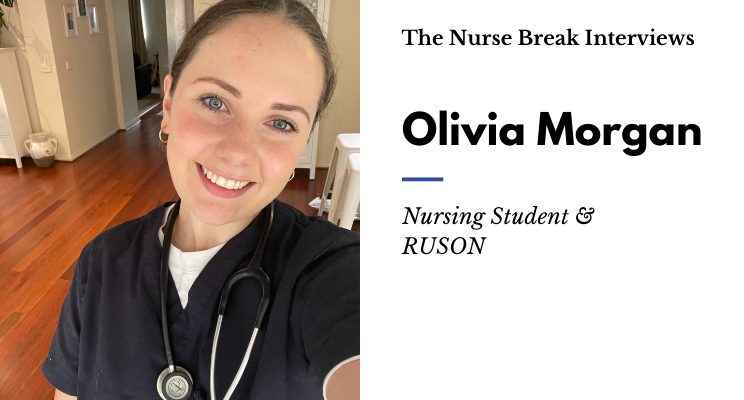Table of Contents
Meet Olivia Morgan! She is just about to finish her nursing degree at Deakin University. She has also been working during Covid19 and her final year as a RUSON (Registered Undergraduate Student of Nursing) at Monash Health within the Emergency Department. (Monash Health have approved the following article).
Olivia has written about her experiences as a student nurse in this article HERE. Read other related student articles here.
Can you tell us about your job as a RUSON?
Being a RUSON has been one of the best decisions I’ve made during my course so far. The RUSON role has a huge focus on the basic foundations of care. The job of a nurse can get so busy, so being able to help with their workload by helping toilet, wash, feed and change patients, can help to ensure that all aspects of patient care are being met. One of the best parts of the job is getting to learn from nurses and doctors every shift. Observing, asking questions or even just listening to hand over, being in the clinical setting a few times a week has expanded my nursing knowledge immensely. My role as a RUSON is really about making sure that patients basic needs are met, and helping nurses in any way I can.
What does a typical day involves?
I am fortunate enough to be a RUSON in the Emergency Department! There is slightly less routine to working in the ED compared to a ward, but it’s been the most amazing experience! When I arrive on my shift, I’ll listen to handover from the previous shift nurses or from the other RUSON so that I can learn about the patients I’ll be looking after and their needs, like if they are immobile or fasting. The job of a RUSON requires you to be quite proactive. Answer call bells, ask patients and family if they need food or water, ask your nurses how you can assist them, restock trolleys/carts and in COVID times, ensure precaution signs and PPE stations are available and stocked.
What are some of the challenges you see nurses facing?
Working with nurses every week, I’ve really noticed how busy and hectic nursing is. There is ALWAYS something to do, or someone to help. The constant flow of patients and somehow, every patient that comes in seems to be more acute than the last means that the nurses are often juggling multiple things at the same time. It’s shown me how vital time management is as a skill for a nurse. Working during a pandemic and seeing the toll that full PPE can have has also been really eye-opening. Sometimes nurses are with a patient for over an hour and are in full PPE under bright hospital lights that whole time, it’s exhausting to just watch! This job has opened my eyes to the demand for nurses. Patients rely on nurses for everything whilst they’re in a hospital. It may be as simple as getting a glass of water, or as complex as a med chart that is 7 pages long, nurses are what makes a hospital function.
What are the positives and things you learnt as a RUSON?
Every single shift I’m working with experts in the field that I am studying in. My knowledge has grown exponentially. I can ask any questions, be that about practice or medications and I’m also able to watch nurses and doctors in real-time and pick up on some tips and tricks that come with expertise. I’ve learnt how beneficial teamwork is. Nursing has such a huge focus on teamwork, and no one is too busy to help someone else. I’ve learnt how a cup of tea or a quick check-in can really make someone feel like they’re a priority. I have learnt so much in the 10 or so months that I have been a RUSON, and I am so grateful that I get to work at Monash, and with the people that I do, because I know that they have made me a better nurse.
What are your tips for those keen on getting a job as a RUSON or AIN?
Most of all, show passionate you are about the field! If you are authentic and show your passion for nursing and patient centred care, you’ll be a more attractive applicant. Once you’re in a hospital working as a RUSON or AIN, be proactive! Don’t wait for a nurse to find you and ask for help with a change or toileting, walk around your department and ask the patients if they need anything! Watch your colleges at every opportunity you get and before you know it, you’ll have so much knowledge and so many tips to help you succeed in your nursing studies and career.





